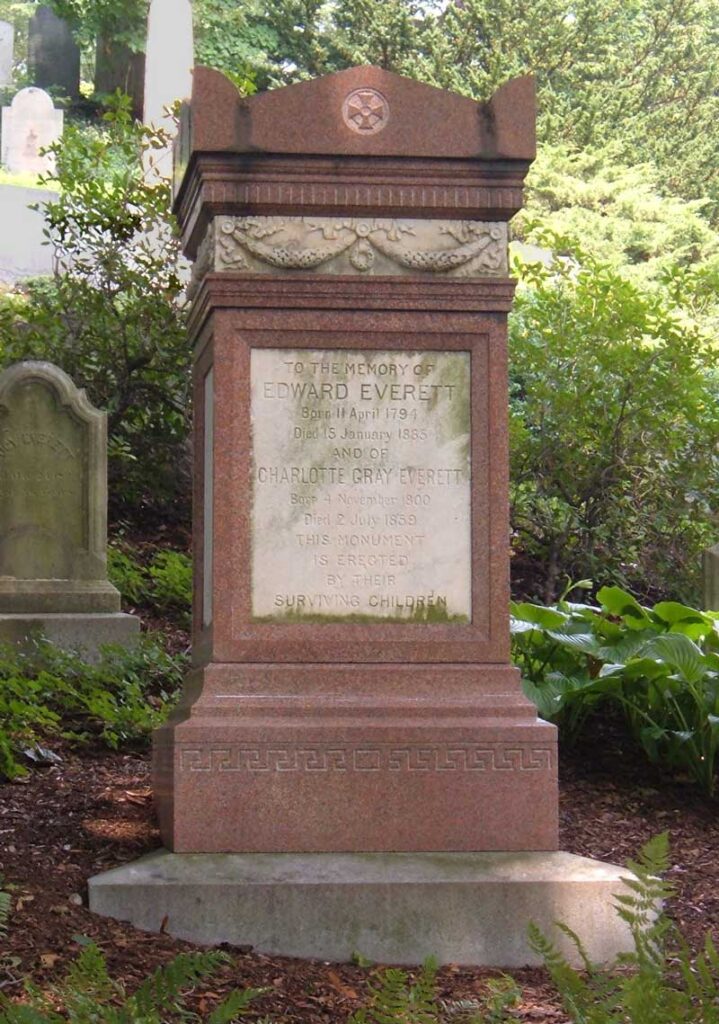Erik Visits an American Grave, Part 71
This is the grave of Edward Everett.
Born in 1794 in Dorchester, Massachusetts, Everett quickly rose into the ranks of the Boston elite. He was admitted to Harvard at the age of 13 and graduated as valedictorian at 17. He became a Unitarian minister and had his own church by 1813. He became known for his florid speeches, which some loved and some hated. He only lasted a year though before taking a job as a professor Greek literature at Harvard, a job which included a 2-year stint traveling around Europe. Unfortunately, professor jobs don’t come with such perks today. He spent a lot of that time in Germany, becoming one of the first Americans to want to transform American education on German lines, a trend that would continue until World War I made Germans the greatest enemies to civilization in known human history about three seconds after they were the heroes of men like Theodore Roosevelt. Anyway, Everett returned to the U.S. in 1819 and taught at Harvard. He also went on a lot of public speaking tours. He became close friends with Daniel Webster and they shared similar class and political interests.
In 1824, Everett moved into politics. He was elected to Congress as a National Republican associated with John Quincy Adams and Henry Clay. Harvard fired him when they found out he was elected to Congress. He served in Congress until 1835, where he was involved in the formation of the Whig Party and worked on foreign affairs. He had the typical political beliefs of a man like this–supportive of the national bank and high tariffs, opposed to Indian removal. However, in 1826, he gave a three-hour speech that digressed into justifying slavery. Many would never forgive him.
Still, in 1835, he was elected to be governor of Massachusetts. There he founded the state board of education, worked on expanding railroads and other industry, and played an active role in settling the boundary dispute between Maine and New Brunswick. However, he lost reelection in 1838 due to a combination of the Liberty Party drawing third party votes away from the Whigs and throwing the election to the Democrats (gee, I wonder if third party advocates learned from this?) and new temperance bill angering the public. Everett was named Ambassador to Britain after William Henry Harrison won the presidency in 1840. He stayed in the job until Polk took the Oval Office in 1845.
Everett then briefly became president of Harvard, hated it, and jumped at the chance to take over as Secretary of State after Daniel Webster’s death in 1852. It was only the last months of the Fillmore administration, but it was still a feather in his cap. He then was elected to the Senate in 1853. When he missed a critical vote on the Kansas-Nebraska Act, antislavery forces in Massachusetts were disgusted and Everett resigned in 1854.
Everett spent the rest of his life traveling around the country, giving his long-winded speeches. He was named the vice-presidential candidate of Constitutional Union candidate John Bell in 1860, but he basically didn’t care and didn’t do anything to campaign. Remaining a conservative Whig, he was deeply involved in the attempt to create the Crittenden Compromise, which Lincoln completely rejected.
Of course, what Everett is really known for his going on like Texas in the ceremony to commemorate the Gettysburg battlefield. In a 2-hour speech, he made all sorts of comparisons to ancient history and called for reconciliation. Then Abraham Lincoln walked up and blew him off the stage in 2 minutes. Everett himself was not bitter about this, knowing the greatness of Lincoln’s Gettysburg Address and he served as an elector for Lincoln in 1864. Everett died in 1865 after catching a cold giving yet another speech, not resting, and then testifying for 3 hours in a lawsuit about his property.
Everett has been portrayed in movies and TV more than you would think. He was played by Gordon Hart in a 1939 short called Lincoln in the White House. José Ferrer portrayed him in the 1991 TV movie about the Gettysburg Address titled The Perfect Tribute. David Francis played him in a 1999 TV movie about P.T. Barnum. In Abraham Lincoln vs. Zombies, a 2012 work of transcendent art, he was played by David Alexander. And Ed Asner was the voice of Everett in a new documentary on the Gettysburg Address that appeared last year.
Edward Everett is buried in Mount Auburn Cemetery, Cambridge, Massachusetts.



